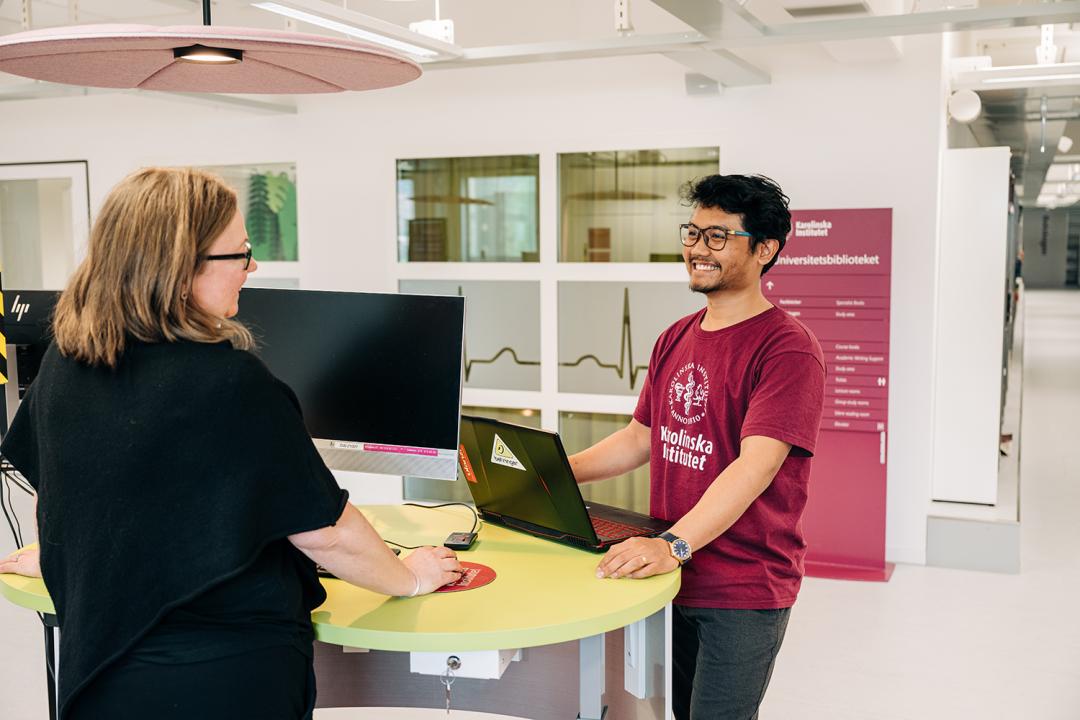KIB Talks: The library's workshops, courses and seminars
KIB offers workshops, courses and seminars for students, doctoral students and researchers at KI in areas such as information retrieval, reference management, scientific publishing and academic writing. The workshops are usually given in English, but the staff also speak Swedish. See the calendar for times and registration. We also organise KIB Talks (a workshops, presentation and courses) "on demand", let us know what you're interested in.
Calendar
- 2026-02-16 - 12:00
- 2026-02-17 - 12:15
- 2026-02-18 - 12:15
- 2026-02-23 - 10:00
- 2026-02-24 - 11:30
KIB Talks for doctoral students and researchers
During the semester, KIB offers a series of workshops open to all doctoral students researchers and other employees at KI. The workshops are held in English but the staff also speak Swedish. See the calendar for times and registration.
In the list you find the titles of the current KIB Talks. The title often get a hint on what they are about, should you like more information (or perhaps you would like to have a presentation or workshop tailor made for you?) please do not hesitate to contact us!
Academic writing & communication
- Giving Oral Presentations
- Writing the comprehensive summary chapter (“kappa”) of your doctoral thesis
- Writing the Literature Review of your half-time
- Writing the Popular Science Summary of your thesis
Information searching
- Smarter Searching (Focus on AI Search Tools) – Improve your search skills for scientific information
- Smarter Searching (Focus on Embase) – Improve your search skills for scientific information
- Smarter Searching (Focus on PubMed ) – Improve your search skills for scientific information
- Smarter Searching (Focus on Web of Science) – Improve your search skills for scientific information
- Systematic searching – introduction to the process of searching for evidence syntheses such as systematic reviews
Reference management
- Manage your references with EndNote desktop
- Managing References with Endnote Online or Zotero
- Collaborate using reference managers
Research data
- Storing and publishing your research data
- Swedish research funding and the requirements for open access in publications and research data
Visualisation
- 5 common mistakes in visual presentation – and how to avoid them!
- Creating publication-quality figures for your next paper
- Design a graphical abstract for your paper
- Get started with your research visualization in 8 easy steps!
- Getting Visual together (peer-to-peer)
Other
- Curate your profile page and CV with KI RIMS
- How to verify your publications in the Bibliometric Verification Toolkit
- iThenticate – a plagiarism detection software
Writing Science and Information Literacy (WSIL)
KIB offers the course Writing Science and Information Literacy for doctoral students at KI. The course, equivalent to 3 credit points, is given three times each term, two on campus and one online. The content of the course revolves around how to structure, write, format and publish scientific texts. Registration through the KI course catalogue.
Courses in systematic reviews
Karolinska Institutet offers doctoral courses in systematic reviews in which the search group teaches literature search methodology:
Workshops for Master's students
KIB offers an open workshop series on academic communication that is designed to help KI's Master's students get the most out of their studies. The workshops are offered on campus and / or as webinars. All workshops are held in English, but the workshop leaders also speak Swedish. You will find dates and times in the calendar.
Here are the workshops for Master's students that we usually offer:
- How to Successfully Study in Sweden
- Finding Scientific Resources
- Reading Complex Academic Texts
- Critical Thinking
- Academic Writing
- Managing References with EndNote Online or Zotero
- Writing Clear and Effective Sentences
- Giving Oral Presentations
- Writing a Research Plan
- Q&A about Writing a Master's Thesis
- Writing an Introduction
- Writing about Your Research for Non-Expert Readers
- Writing a Discussion
- Writing an Abstract
- Effective Peer Review
- How to Transform your Master's Thesis into a Publishable Article
- Using Sources Effectively and Avoiding Plagiarism
Contact us
Are you a teacher at a programme/course? You can order a course/workshop for your students. Please contact us, we are happy to tell you more about what the library offers.

Contact the library
You are welcome to contact us through phone, chat or email.
Opening hours chat & phone
If you would like us to get back to you, please submit your contact information in the form below along with your feeback.
